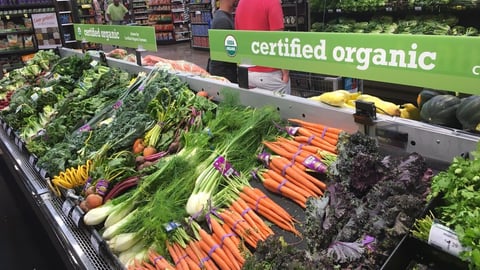Why Grocers Should Be Targeting Flexitarians
Though the majority of Americans still eat meat, consumers' increasingly flexible dietary habits hint at the multi-billion dollar potential impact of plant-based products on the nation’s food and beverage market.
A new report by market research firm Packaged Facts shows that consumers are increasingly more adventurous with what they eat and more of them consider themselves flexitarian than in the past.
Packaged Facts' report, The Organic and Clean Label Food Shopper, reveals that 13% of Generation Z considers themselves flexitarian, showing the trend is especially prominent in young people. Companies nationwide are expanding their product lines in response to changing consumer diets.
Earlier this month Kroger announced plans to introduce meatless burger patties and non-dairy beverages, along with other new plant-based products, into its Simple Truth brand beginning in autumn.
“A significant number of meat eaters surveyed claimed they do or would buy plant-based products, including those products that are blended with meat and plants, revealing that the meat industry faces many changes in the coming years as more consumers turn to plant-based meals and reduce their meat consumption in favor of more plants,” says David Sprinkle, research director for Packaged Facts.
However, it’s not just semi-vegetarian diets driving the plant-based trend. The pure novelty of the animal-free products are often enough to inspire some meat-eating consumers to try them. Packaged Facts’ survey finds that 74% of shoppers are looking to turn routine meals into different experiences, creating opportunities for meat suppliers and plant-protein companies alike to give customers new recipe ideas that distinguish their products.
Clean Connotations
Packaged Facts' report points to the overlap between consumers seeking organic or clean label products and the uptick in the popularity of plant-based proteins. Because animal welfare and environmental concerns are important tenets of the clean label movement, plant-based vegan and vegetarian foods are often seen as cleaner than animal-based products even if not all of their ingredients are “clean”. This is leading a number of people to reduce their consumption of animal-based products and switch to plant-based alternatives. Labeling plant-based products with the name of the animal product they are imitating (e.g., almond milk, veggie sausage) makes this shift easier for consumers who are beginning to lead a plant-based diet.
In June, Tyson Foods announced the launch of new Raised & Rooted plant-based chicken nugget alternatives and blended burgers that are a blend of Angus beef and pea protein. These products do not carry the Tyson name and feature the look of a different brand.
Although these products are not clean label due to ingredients such as “pea protein isolate,” they go in a similar direction and try to appeal to general consumers. The products list a number of inputs on the front of the package that have clean connotations (pea protein, egg white, golden flaxseed, and bamboo), which instill trust in recognizable and healthy food among the general consumer. Additionally, not using the Tyson brand name gives consumers an impression of a smaller startup company with a more authentic story.
In line with the trend toward more plant-based and (assumedly) cleaner foods, a number of products are also combining vegetables with meat or other ingredients to put a healthier spin on traditional foods. For instance, South Mill Champs offers Shrooms Splits Filet Mignon and Portabella Jerky, which is a product blending mushroom jerky with beef jerky to create a healthier and more sustainable snack with less meat content. The product also has a number of clean label claims including no artificial ingredients, minimally processed, and grass-fed beef. Similar combinations include vegetables cropping up in new gluten-free or low-carb products.






